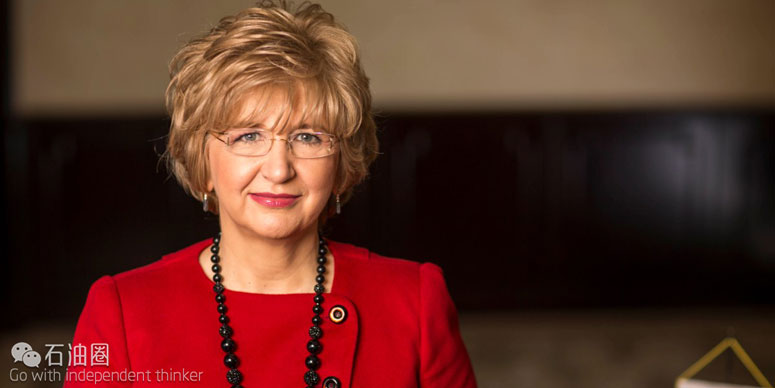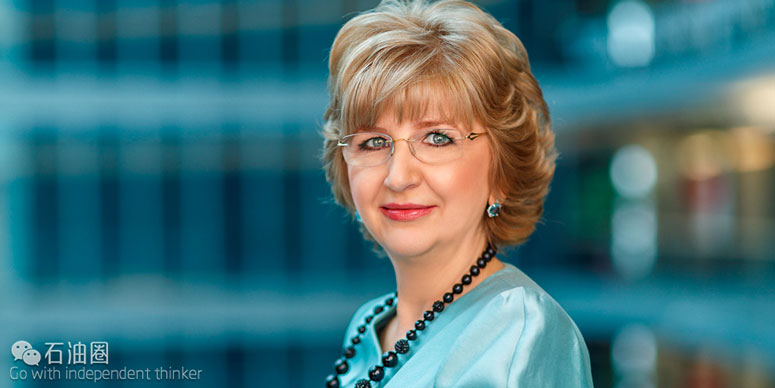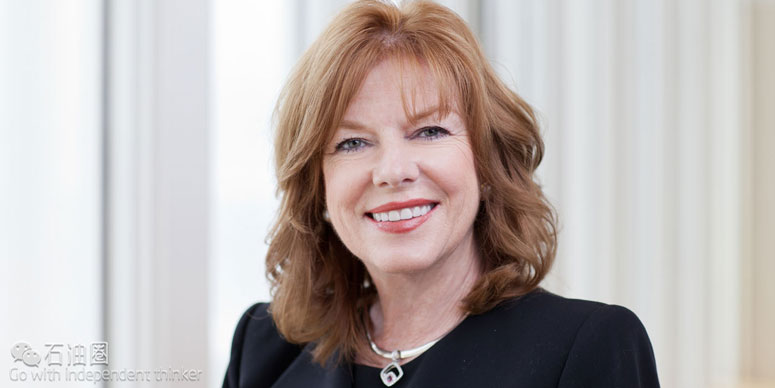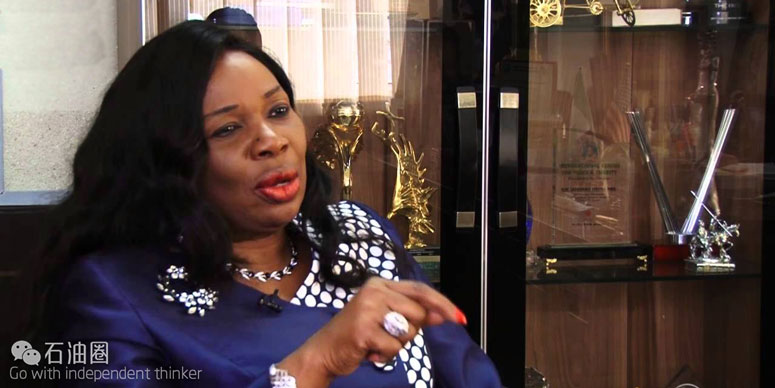
俗话说,女性能顶半边天。然而像油气这种特殊行业,性别壁垒仍然存在,并且十分严重。而也有一些女强人打破了这些壁垒,成为了油气行业中举足轻重的大佬级人物。她们有什么过人之处,是如何一步步走向职业巅峰的呢?
提到性别壁垒,恐怕没有一个比油气行业更严重的了。数十年来,CEO办公室都是为那些拥有高风险承受能力的大男子主义者准备的。石油圈原创www.oilsns.com
关于为什么女性无法打破油气行业的性别壁垒,已经有人花费了大量的笔墨研究,其中包括皮尤研究中心对于女性领导公司能力的研究。在调查中,有50%的女性以及35%男性认为许多行业的领导层还不适合女性。另一项研究深入挖掘了277家上市石油公司CEO的背景,他认为油气行业CEO中缺少女性的主要原因是很少有女性学习工程,而工程通常又是进入决策层的最正常的路线。

2013年,只有13%的工程师是女性。2014年的研究表明,只有1%的油气公司的CEO是女性。但是2015年,Vicki Hollub这个在Occidental Petroleum打拼33年的老手,成为了美国第一个大型石油公司的CEO,创造了历史。
Vicki Hollub | Occidental | 总裁&CEO
Hollub,56岁,去年替代Stephen Chazen成为Occidental全球油气业务的新掌门人,而Chazen在股东大会上已宣布辞职。
Hollub毕业于亚拉巴马大学,作为矿物工程师,Vicki Hollub让公司在美国德克萨斯和其它州的油井收入了120亿美元。Occidental在官方声明中对Hollub的升职是这样评论的:“董事会选择Vicki是因为她亮眼的业绩,她成功的提高了我们在国内油气业务的盈利和效率”。据彭博社报道,Hollub在2014年的收入是366万美元,其中包括516,697美元的工资+股票期权。
Mariana Gheorghe | OMV Petrom | CEO
Mariana Gheorghe,60岁,在2014年财富杂志评选出的“在欧洲、中东和非洲最具影响力的女性”排行榜中排第19位,是罗马尼亚油气巨头Petrom的首位女性CEO。
1993年,取得法律、经济以及企业金融的学位后,Gheoghe一直为欧洲复兴开发银行工作;2006年,她成为了Petrom的CEO。石油圈原创www.oilsns.com

Mariana Gheorghe
OMV Petrom是罗马尼亚最大的石油企业,Gheoghe支持企业积极开拓发电市场,2015年共发电34.5亿瓦时,占全国发电总量5.7%,成为全国第4大发电企业。特别是Brazi热电厂的发电设备启停迅速,被国家电网用来作为调峰电厂。
Ceri Powell | 荷兰皇家壳牌 | 执行副总裁&国际勘探部主管
2013年,Ceri Powell成为壳牌国际勘探部主管,而且一度成为财富杂志排行最高的女性高管。在2014年财富杂志评选出的“在欧洲、中东和非洲最具影响力的女性” 排行榜中排名第21位。Powell来自威尔士,拥有构造地质学的博士学位,在1990年加入壳牌。在出任现在的职位之前,她曾经在壳牌勘探部和商业开发部担任过很多职位,并领导勘探部在澳大利亚、马来西亚、尼日利亚、墨西哥湾和阿尔巴尼亚发现重要区块。
Debra Reed | Sempra能源 | CEO&董事会主席
Reed,60岁,毕业于南加州大学土木工程专业,2011年开始担任Sempra能源公司的CEO,2012年开始担任其董事会主席。自1978年加入该公司的子公司SoCalGas,Reed已经在Sempra能源公司工作了38年。1988年,Reed成为了SoCalGas的第一位女性首席执行官。

Debra Reed
作为财富评选的“世界五百强公司的25位女性CEO”之一,Reed从2011到2016年连续6年入选财富杂志评选的“最具影响力的商界女性”,其中2015年排在第23位,今年又上升了一位。2014年,Reed的收入就达到了885万美元,包括112万美元的基础工资。另外,Reed也是哈里伯顿和卡特皮勒董事会的一员。
Catherine Uju Ifejika | Brittania-U有限公司 | CEO&董事会主席
相对于其他国家上层领导人中女性的缺席,尼日利亚算是一个例外。非洲最大的石油生产商NNPC的石油部长是一个女人—Diezani Alison Madueke,而且其他石油公司的女老板也不在少数,其中一位就是Catherine Uju Ifejika。
Catherine Uju Ifejika是石油勘探和开发企业Brittania-U有限公司的董事长兼首席执行官。在取得法学学位后,她进入Texaco从事法律顾问,后来成为Texoco在西非公共事务和政府事务的秘书。在2001年,她用从前雇主得到的遣散费50251美元和115577美元的贷款成立了Brittannia-U。石油圈原创www.oilsns.com

Catherine Uju Ifejika
由于缺少石油工程背景,这个被称为“非洲最富有的女人”曾被一些人质疑是否可以胜任领导层工作。但是她回应说:“我确实不是一个地质学家,我也没有勘探和开发的经验。但我唯一知道的事情就是去做一些创造性地、让别人欣赏的事,而不是没有价值的,当然我并不是说工程师或者地质学家不重要……现在的我也能够说一些地质学专用语,也可以读懂一些复杂的地质图,甚至当他们带来一些技术上的问题时,我们可以一起解决—因为我能够战胜我心中对未知的恐惧。”
巾帼不让须眉,以上5位女性用她们的传奇人生诠释了油气女王的炼成史。我们要学习她们开阔的眼界、深邃的思想,特别是对油气行业的信任和坚持,同时期待更多的女性用自己的智慧和坚韧拼出一片天地!
来自/Andrew Topf 译者/曾旭洋 编辑/李倩
When it comes to glass ceilings, there is probably none tougher to crack than the oil and gas industry. For decades the corner office has been the preserve of alpha-male CEOs with a high tolerance for risk.
Today, the maxim still holds true. In Oilprice.com’s list of the 12 richest oil and gas tycoons, not one is a woman. Recently though, Vicki Hollub, a 33-year veteran with Occidental Petroleum, made American corporate history by becoming the first female CEO of a major U.S. oil company.
Hollub, 55, will assume assume control of Occidental’s global oil and gas business, replacing current chief executive Stephen Chazen who will step down at the 2016 AGM.
“The board selected Vicki based on her strong track record of successfully growing our domestic oil and gas business profitably and efficiently,” Occidental said in a statement announcing her promotion. According to Bloomberg, Hollub was paid $3.66 million in 2014, including a $516,697 salary plus stock options. The Alabama-trained mineral engineer oversaw wells in Texas and other U.S. states that reaped $12 billion.
Much ink has been spilt over why more women haven’t cracked the glass ceiling in America, including a new Pew Research report that explores perceptions about women’s ability to lead companies. Among the findings: 50 percent of women and 35 percent of men agree that many businesses aren’t ready to hire women for top executive positions. Another study drilled down into the backgrounds of 277 CEOs from the largest publicly-traded U.S. and international oil and gas companies. It found that the most likely reason for the dearth of female oil and gas chief executives is the lack of women studying engineering – the most common path to the industry’s executive boardrooms. In 2013, only about 13 percent of engineers were female. The good news for women is that the number of CEOs in the industry is expected to increase as more enter the engineering field.
While the 2014 study found that only 1 percent of oil and gas companies surveyed were led by women, a search one year later finds Hollub in good company, with a number of women occupying perhaps not the corner office, but one with a pretty sweet view nonetheless. Following, in no particular order, are women who exert considerable power and influence in the oil and gas industry today:
Mariana Gheorghe, CEO, Petrom.
Ranked 19th in Fortune magazine’s 2014 list of most powerful women in Europe, the Middle East and Africa, Mariana Gheorghe is considered one of the most influential women in Eastern Europe. The 59-year-old was the first female CEO of Romanian oil and gas group Petrom. After completing degrees in law, economics and corporate finance, Gheorghe worked for the European Bank of Reconstruction and Development form 1993 to 2006, when she took the helm of Petrom.
Ceri Powell, Global Head of Exploration, Royal Dutch Shell.
According to Fortune, Ceri Powell in 2013 became the highest-ranking female executive at Shell when she took charge of the group’s global exploration. She is 21st on Fortune’s list of most powerful women cited above. Originally from Wales, Powell holds a doctorate in structural geology and joined Shell in 1990. She held numerous positions at Shell in exploration and new business development before undertaking her current post, where she has led new discoveries in Australia, Malaysia, Nigeria, the Gulf of Mexico and Albania, according to Fortune.
Debra Reed, CEO, board chairman, Sempra Energy.
Graduating summa cum laude from the University of Southern California with an undergrad in civil engineering, Reed joined SoCalGas in 1978 and became the company’s first female officer 10 years later. As one of 25 female CEOs of Fortune 500 companies, Reed was recognized as one of the magazine’s “50 Most Powerful Women in Business” from 2011 to 2014. Salary.com has Reed pulling in $8.85 million in 2014, including base pay of $1.12 million. Reed also serves on the boards of Halliburton and Caterpillar.
Trudy Curran, senior vice-president, general counsel and corporate secretary, Canadian Oil Sands Ltd.
With a background in securities and corporate finance law, Trudy Curran joined Canadian Oil Sands in 2002 after holding senior positions with EnCana, Canadian Pacific Limited and now-defunct Canadian Airlines. In 2012, Curran received a Scotiabank Corporate Executives Award and was ranked second out of the Top 100 Most Powerful Women in Canada, behind No. 1 Amiee Chan, president and CEO of Norsat.
Catherine Uju Ifejika, chairman and CEO, Brittania-U Limited.
In terms of female representation in the upper echelons of oil and gas, Nigeria may be an outlier. The largest oil producer in Africa is headed by a woman, Petroleum Minister Diezani Alison-Madueke, and is seeing a growing number of female oil industry bosses. One of them is Catherine Uju Ifejika, chairman and chief executive of Brittania U Limited, an oil exploration and production company. After graduating with a law degree, Uju Ifejika took a job as junior counsel with Texaco, then became Company Secretary Public and Government Affairs for West Africa. In 2001, she set up Brittania-U with N10 million (USD$50,251) in severance pay from her former employer and a USD$115,577 loan.
The company is currently suing Chevron over the sale of three oil mining leases, for which Brittania-U paid $765 million in 2013. A recent feature on Uju Ifejika, who is described as one of the richest women in Africa, has the oil tycoon dismissing those who criticize her rise to power despite a lack of background in petroleum engineering: “I’m not a geologist and I have never worked in exploration and production,” she told Fascinating Nigeria. “The only thing I know is how to take something that is nothing and create something out of it that you can see and appreciate … Not being an engineer or a geologist was immaterial. Today I speak the language of the geologist, I can interpret the maps and when they bring in technical things we look at them together – because I was able to rise above my fear level.”
未经允许,不得转载本站任何文章:
-

- Linda
-
石油圈认证作者
- 毕业于南开大学传播学专业,以国际权威网站发布的新闻作为原始材料,长期聚焦国内外油气行业最新最有价值的行业动态,让您紧跟油气行业商业发展的步伐!


 石油圈
石油圈




